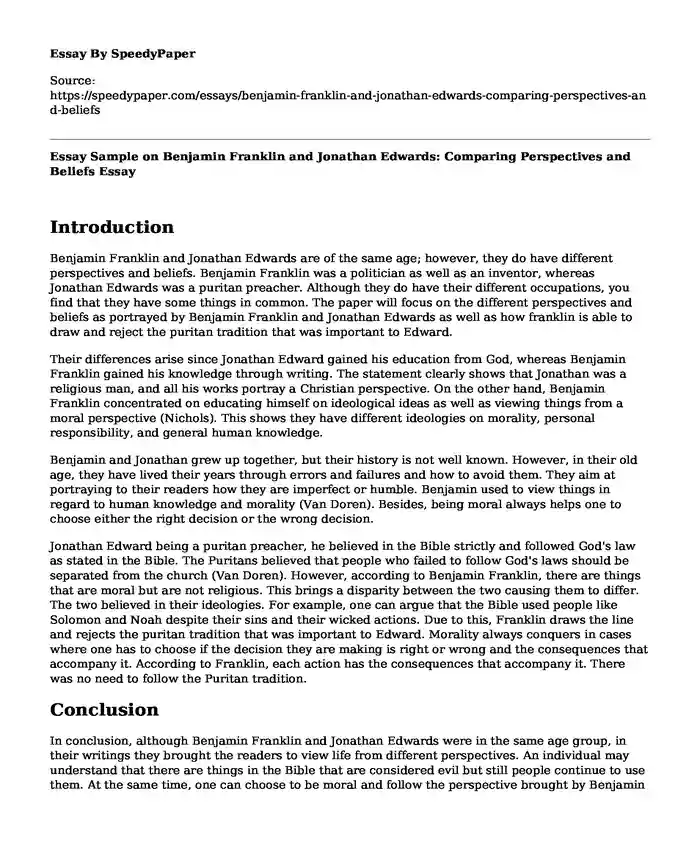
| Type of paper: | Essay |
| Categories: | Political science Historical & political figures |
| Pages: | 2 |
| Wordcount: | 507 words |
Introduction
Benjamin Franklin and Jonathan Edwards are of the same age; however, they do have different perspectives and beliefs. Benjamin Franklin was a politician as well as an inventor, whereas Jonathan Edwards was a puritan preacher. Although they do have their different occupations, you find that they have some things in common. The paper will focus on the different perspectives and beliefs as portrayed by Benjamin Franklin and Jonathan Edwards as well as how franklin is able to draw and reject the puritan tradition that was important to Edward.
Their differences arise since Jonathan Edward gained his education from God, whereas Benjamin Franklin gained his knowledge through writing. The statement clearly shows that Jonathan was a religious man, and all his works portray a Christian perspective. On the other hand, Benjamin Franklin concentrated on educating himself on ideological ideas as well as viewing things from a moral perspective (Nichols). This shows they have different ideologies on morality, personal responsibility, and general human knowledge.
Benjamin and Jonathan grew up together, but their history is not well known. However, in their old age, they have lived their years through errors and failures and how to avoid them. They aim at portraying to their readers how they are imperfect or humble. Benjamin used to view things in regard to human knowledge and morality (Van Doren). Besides, being moral always helps one to choose either the right decision or the wrong decision.
Jonathan Edward being a puritan preacher, he believed in the Bible strictly and followed God's law as stated in the Bible. The Puritans believed that people who failed to follow God's laws should be separated from the church (Van Doren). However, according to Benjamin Franklin, there are things that are moral but are not religious. This brings a disparity between the two causing them to differ. The two believed in their ideologies. For example, one can argue that the Bible used people like Solomon and Noah despite their sins and their wicked actions. Due to this, Franklin draws the line and rejects the puritan tradition that was important to Edward. Morality always conquers in cases where one has to choose if the decision they are making is right or wrong and the consequences that accompany it. According to Franklin, each action has the consequences that accompany it. There was no need to follow the Puritan tradition.
Conclusion
In conclusion, although Benjamin Franklin and Jonathan Edwards were in the same age group, in their writings they brought the readers to view life from different perspectives. An individual may understand that there are things in the Bible that are considered evil but still people continue to use them. At the same time, one can choose to be moral and follow the perspective brought by Benjamin Franklin who argues based on morality. That is either something is right or wrong and the human nature of doing things.
Works Cited
Nichols, Stephen J. Jonathan Edwards. Ligonier Ministries, 2012.
Van Doren, Carl. Benjamin Franklin and Jonathan Edwards, Selections from Their Writings. Nabu Press, 2010.
Cite this page
Essay Sample on Benjamin Franklin and Jonathan Edwards: Comparing Perspectives and Beliefs. (2023, Sep 12). Retrieved from https://speedypaper.com/essays/benjamin-franklin-and-jonathan-edwards-comparing-perspectives-and-beliefs
Request Removal
If you are the original author of this essay and no longer wish to have it published on the SpeedyPaper website, please click below to request its removal:
- Rhetorical Analysis Essay Example
- The Dolphin Project Essay Example
- Free Essay Sample on Civil Societies
- Free Essay on Rhetorical Strategies in 'Obamacare Is an Unstable Economic Model'
- Free Essay: Polymerase Chain Reaction
- Exploring the Vital Role of Hydraulic Engineering in Managing Water Resources - An Essay Sample
- Neurotransmission: The Backbone of Sensory Perception in Living Organisms - Essay Sample
Popular categories




